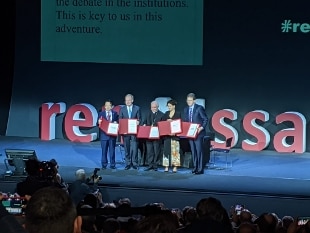- The Vatican brings together world experts for the ethics of artificial intelligence
- Artificial intelligence, the EU aims to become the third pole
- Artificial intelligence, the Italian market is worth 200 million euros
Share
by Celia Guimaraes February 28, 2020 "The European Parliament will contribute to the reflection on how the EU can become a world leader in transformation, but remain a global model in protecting people's rights and dignity". This was said by the President of the European Parliament David Sassoli speaking at the conference "RenAIssance, for artificial humanistic intelligence", promoted by the Pontifical Academy for Life in Rome.
Sassoli also recalled that the European Union has already embarked on the path to a 'humanistic' approach to artificial intelligence : "We need rules that combine technological progress, business development and worker protection. In a nutshell guaranteeing democracy ". Otherwise, "algorithms will govern us", added Sassoli, and for this reason the fourth industrial revolution "must be accompanied to increase and not diminish our social, political and economic rights. And to do so we need collaboration and a legal framework. adequate ".
The President of the European Parliament attended the signing, in Rome, of the 'Rome Call for AI Ethics' (here the original text, in English) for the ethical development of artificial intelligence, a document promoted by the Pontifical Academy for Life and signed by the Minister for Innovation and Technology Paola Pisano, the general manager of FAO Dongyu Qu, the president of Microsoft, Brad Smith, and the vice president of IBM, John Kelly III.
The President of the European Parliament then invited Monsignor Paglia, president of the Pav, to Brussels:
Archbishop Paglia: president @DavidSassoli will bring the Call for Ethics on #AI to @europarl, Sassoli replies: come to illustrate it in # Brussels # Renaissance pic.twitter.com/UYcOj9DWqz
- Celia Guimaraes (@viperaviola) February 28, 2020President Pav: after the atomic threat and the climate crisis, there is now artificial intelligence
We must avoid the 'technologized' man: "After the atomic bomb and the environmental crisis, with new technologies we are on the third front that directly questions the human. We risk destroying the specific qualities of human beings and humana comunitas" .
This is the danger feared by Monsignor Vincenzo Paglia, president of the Pontifical Academy for Life, opening the conference "RenAIssance, For an artificial humanistic intelligence", at the Conciliazione Auditorium. Monsignor Paglia admits how good technologies can bring us, from making it easier to carry out tasks, to the best quality of life. But, he warns, but they are not just tools because they change our way of being in the world and often we don't realize we interact with them.
"The intervention of ethics at games is almost useless", he observes, "an ethics that reflects on the criteria that underlie the creation of the algorithms and on the responsibility of those who work in the individual stages of production. Ethics is called to accompany the entire creation cycle of technological products ", in all its phases. In this sense, the Rome Call for AI Ethics document establishes a formal commitment which, according to Monsignor Paglia, "does not represent a goal but a starting point".
Pisano: technology must be inclusive
"We understand that technology is not transparent, we must reflect to make it more inclusive, understand how it is applied, also feel companies and civil society. Therefore, it must not be applied only to economic areas, but also in major societal problems , just as sanctioned in the collaboration signed yesterday between Bambino Gesù and Ibm Pediatric Hospital to use Artificial Intelligence in the diagnosis of rare diseases in children, "said the Minister of Innovation, Paola Pisano
John Kelly III, IBM vice president: goodbye DeepBlue
In order for AI to be effectively "at the service of humanity," said John Kelly III, IBM has chosen to say enough about the challenges between the human mind and computer, such as the checkered ones (the reference is to 11 May 1997, when the IBM's DeepBlue super computer beat in just 19 moves the greatest chess player in the world , Garry Kasparov). The goal today, explained the executive vice president, is "the collaboration between man and machine. We and our colleagues work hard in the agricultural, health, energy sectors, to bring the best human brains to work together and reach the best decisions in a timely manner ".
Brad Smith, MIcrosoft President: AI the most powerful tool in the world
"Artificial intelligence is too important a technology to be guided only by those who create it and will play a fundamental role in the future of humanity," said Microsoft President Brad Smith, who returns to Rome exactly one year from his first visit to the Vatican , again for the same reason: to talk about the risks and opportunities of this technology: "For example, it will allow you to find a cure for cancer and a way to ensure environmental sustainability" but it also presents risks, from cyber attacks on mass surveillance. "Any tool can become a weapon," reiterates Smith, and "AI will be the most powerful tool in the world."
Pope Francis, skip the speech
There was also an audio-video connection with Pope Francis who, due to health problems, instead sent his speech, in which he underlined, among the risks and opportunities of artificial intelligence, the certainty that "is found at the heart of the period change we are going through ".

